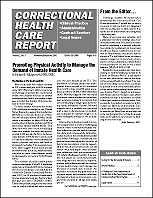Treating Intoxication and Withdrawal
Author: Dana M. Arlien, M.D..; John N. Chappel, M.D., M.P.H..
Source: Volume 20, Number 06, September/October 2019 , pp.81-97(17)

next article > |return to table of contents
Abstract:
This article addresses perhaps the most common problems facing the correctional physician, nurse, or psychiatrist: substance intoxication and withdrawal. Patients may present with predictable alcohol withdrawal symptoms, such as upper extremity tremors and diaphoresis. They may present with less predictable problems as well. A patient may present with delirium a week after incarceration as a result of withdrawing from long-acting benzodiazepines or opiates or with prolonged opioid withdrawal symptoms from methadone. Irritability and dysphoria suggesting depression may result from stimulant withdrawal. In the incarcerated population where substance use is very common, intoxication and withdrawal states are varied, complicated by polysubstance use and psychiatric problems. Many facilities do not give the treating physician the option of urine drug screens because of legal and chain-of-custody considerations. The patient’s report and physical findings may be the only information available. We address each of the main substance categories in this article providing definitions and diagnostic criteria for dependence and withdrawal according to the Diagnostic and Statistical Manual of Mental Disorders (DSM-IV-TR; American Psychiatric Association, 2000). For each category, we offer information about the clinical manifestations of withdrawal and review the literature on acute treatment options. Included in this article are tables that summarize clinical findings and medication regimens for managing withdrawal. Although much of the literature is based on research in community populations, it is generalizable to incarcerated patients.Keywords: Intoxication vs. Withdrawal; Alcohol Withdrawal; Benzodiazepines; Sedative Hypnotics; Opioids; Stimulants; Marijuana; Hallucinogens; Phencyclidine and Ketamine; Inhalants
Affiliations:
1: Private Practice; 2: (Deceased) University of Nevada School of Medicine.